by [email protected] | Mar 31, 2021 | Bold Biographies
Podcast: Play in new window | Download
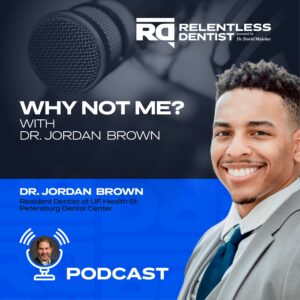
Dr. Jordan Brown reminds me of what’s good about the profession of dentistry. His “Why not me?” attitude is truly admirable. He may be a resident, but don’t let his youth fool you — he is wise beyond his years. His robust story, compelling bio, and positive disposition will surely inspire many in our profession.
Listen in as Dr. Jordan talks about skyrocketing dental tuition, becoming a lifelong student of clinical and communication skills, the importance of access to care of the underserved, and leveraging Instagram as a force for good.
Tune in and find more Bold Biographies
Key Quotes:
- “From seeing that transformative experience from a close family member of mine, that kind of led me to want to not only be a dentist, but be a dentist that’s practicing in underserved areas where I know my work will have the biggest impact on those patients.”
- “I knew I wanted to work in these [underserved] communities and I knew I wanted to have advanced training. So that way, when I did go out and venture on my own, I would know how to handle these cases in a methodical way. Not only just to get the job done, but to get the job done well.“
- “Information should be shared. Knowledge is power.”
- “There are a few different ways that dental students can pay for tuition. One is loans. Most people do that. Second, military. Military is a fantastic option for paying for dental school. But there’s a third lesser-known option that a lot of people don’t know about. And that’s what I did. So I did the National Health Service Corps scholarship program.”
- “You can either work in a fairly qualified health center, you can work in private practices, you can start your own practice. From a private practice standpoint, you can start a practice, but it has to satisfy the criteria that the program sets forth.”
- “In my life I always follow the model of ‘Why not? Why not me?’”
- “I never let difficulty deter me from reaching my goals. And I highly encourage all your listeners, students, dentists, just to think about why can’t you be that person that great things happen to.”
- “You have to make your patients like you because people buy things from people they trust. Patients will not accept your dental treatment recommendations if they don’t like you.”
- “The last thing that I think is really important is that, when you’re checking out your patients at your desk, give them your personal cell phone number.”
- “You have to go above and beyond for your patients because they can go anywhere else to get that treatment.”
- “You can always improve upon yourself and always have a growth mindset. That when you have any setback, any failure in your career, just use that as an opportunity to learn, grow, and improve and just to do better.”
Featured on the Show:


by [email protected] | Mar 24, 2021 | Legendary Leadership
Podcast: Play in new window | Download
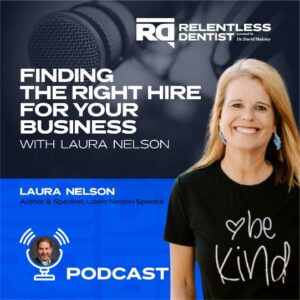 Hiring is complicated. You don’t want to be working with a team who doesn’t embrace and support your goals. Good thing Laura Nelson is there to guide us throughout the process. She recently released a new book, “Hiring without Hesitation: A How-To for Small Business Success” which I am excited to share. I’ve known Laura for a long time, and I admire the honest value she’s bringing to the dental industry.
Hiring is complicated. You don’t want to be working with a team who doesn’t embrace and support your goals. Good thing Laura Nelson is there to guide us throughout the process. She recently released a new book, “Hiring without Hesitation: A How-To for Small Business Success” which I am excited to share. I’ve known Laura for a long time, and I admire the honest value she’s bringing to the dental industry.
Listen in as Laura talks about best practices in hiring the right people for your practice and how to quickly spot a potential rockstar. She also touches on office culture and why you should involve the whole team in the hiring process.
Be inspired and meet more Legendary Leaders
Key Quotes:
- “ It starts with leadership. It really starts with your attitude about hiring. if you think there’s no good people out there, then there’s going to be no good people out there.”
- “You need to have an environment and a culture where people want to come to work there because they’re considering potentially leaving somewhere else maybe, or part-time or whatever to come to you.”
- “If you wait to just hire when you need it, and you’re desperate, you’re gonna hire a square peg and try to put it in a round hole and then you’re going to fail and then you’re going to hit hiring and it’s going to be the cyclical problem that you have.”
- “Always be looking. Don’t rely on just when you need it. ‘Cause if you wait until then it’s going to probably be too late.”
- Let them [team] know that you’re always looking. First of all, it’s going to keep them on their toes. And then second of all, they’re not going to be whispering in the break room going,” Oh my gosh, you know, the [boss] is doing an interview. Who’s he canning? Who is he letting go?” Right? Like it’s just full transparency. So I definitely think involving your team is an important part.”
- “There’s a difference between a job description and a job advertisement. So we need a job description, right? We need a checklist of what are they going to get trained? What are they responsible for and what are they accountable for? But an advertisement is meant to attract.”
- “I’ve had some dental assistants who are amazing at six months and I’ve had some that stink after six years. So, it doesn’t really matter, the amount of experience. So, really going through your job ad and saying, what is required? And then what is nice to have?”
- “ I’ll take personality over experience all day long.”
- “I want somebody to be teachable with experience. That’s the best, that’s the rock star, right? But if they’re not teachable and they’ve got a lot of experience, like you said, they could be stuck.”
- “And again, it ties back to the leadership and the culture. You know, you’ve got to foster a culture, that’s like that, the ability to make mistakes, the ability to learn and grow their ability to take responsibility, to work together as a team for you to be vulnerable for.”
- “You can take a rockstar, put them in a bad culture and kill them. Or you can take an average employee and put them in an amazing culture and make them a rockstar.”
- “Reference checks — and I’ve been guilty of not doing them. You’ve been guilty of not doing them. They are so important. And it’s important.”
Featured on the Show:


by [email protected] | Mar 17, 2021 | Magnificent Marketing
Podcast: Play in new window | Download
 I have a confession to make. My journey to business was not a piece of cake. You see, I’m an introvert posing to be an extroverted guy trying to connect with the community where I was building my practice. Then came Matthew Pollard, the person that I can relate to. He is the author of the well-received books “The Introvert’s Edge. How the Quiet and Shy Can Outsell Anyone” and “The Introvert’s Edge To Networking”. He’s also a confessed introvert. Yet, instead of making his introversion a handicap, he successfully transformed it into an asset and made it work to his advantage.
I have a confession to make. My journey to business was not a piece of cake. You see, I’m an introvert posing to be an extroverted guy trying to connect with the community where I was building my practice. Then came Matthew Pollard, the person that I can relate to. He is the author of the well-received books “The Introvert’s Edge. How the Quiet and Shy Can Outsell Anyone” and “The Introvert’s Edge To Networking”. He’s also a confessed introvert. Yet, instead of making his introversion a handicap, he successfully transformed it into an asset and made it work to his advantage.
Listen in as Matthew talks about how to find systems that will allow you to fill those skills gaps and leverage on your natural introverted strengths. Find a strategy as an introvert that will work for you.
Be inspired and tune in to more Magnificent Marketing Episode Podcast
Key Quotes:
- “I think the important thing people will realize is, being an introvert doesn’t mean you’re a second-class citizen. It also doesn’t mean you should behave more extroverted and that’s the key to success.”
- “The important thing for introverts to know is that your job is not to educate the client with your years of experience. It’s to motivate and inspire action while embedding you as the only logical choice of which to do that action with.”
- “So the biggest thing that I want everyone to know is first, you don’t need to be extroverted. But as an introvert, it’s not over. Educate and inform to get them to make a decision. It’s to tell them what they need to know to help them make an easy decision.”
- “Let’s frame this in a way that everyone will understand. Real costs — Okay, I’m going to need concentrating because I haven’t done this expensive thing. Second, opportunity costs. Here’s what it’s going to look like if I grind my teeth for the next 20 years and the expensive treatments that I’m going to potentially have because of that. And the emotional cost is, I’m stressed.”
- “You said, we know this, we know this, we know this, we know this. Yes you do. But by saying all of these things, here’s what I hear as a customer. Okay. Fear, fear, jargon, issues, risk, fear, and money. That is all I hear in my head. It sounds like you’re trying to scare me into spending money. It does not sound like you care.”
- “People always have the money. They just act to you that they don’t because all they’re hearing is jargon. Now your teams are just as bad at this. As a matter of fact, they are less experienced than you.”
- “Don’t sell stuff to people that they don’t need. Which story I’d prefer you to is just use logical detail because then, you won’t get the sale. But if you go in to tell a story, make sure that the person will truly benefit.”
- “If you choose a clientele that you really serve, well, then look at the three major outcomes, or the three major problems that they had and create one story for each one of those. Then learn those stories and practice those stories yourself, and like, just roll off the tongue.”
- “Congruence and comfortability and repetition of people hearing the same story over and over will motivate them to take action.”
- “Things have changed. We don’t like getting scared into decisions anymore, right? We love to believe that the person if we believe that you care, we’ll buy anything you put in front of us. If we believe that you’re trying to monetize, we’ll buy nothing. And then we’ll start looking around.”
- “In truth, the reason why a lot of your customers don’t respect you like they used to, the reason why a lot of your customers aren’t open to you suggesting what to buy is mainly because it’s a marketing issue. You don’t know how to articulate your value.”
- “We have to confront that stigma because it doesn’t mean being introverted, doesn’t mean we’re second class citizens. It means our path to success is just different to that of an extrovert. The other thing is we have to stop using it as a crutch.”
- “Empathy is hugely leadership. Empathy is massive in sales listening. It’s something that extroverts perhaps don’t do so well. And because of that, again, we have a massive advantage.”
- “I’ve been responsible for five multimillion-dollar success stories. So for me, one of the things that I always try to get people to understand about my story is that being an introvert doesn’t mean you can’t succeed unless you decide.”
- “Find a strategy as an introvert that will work for you. And you’ll realize that when you find that strategy, you’ll actually run circles around those people that seem to be natural because a system will always outperform one that doesn’t have one.”
Featured on the Show:


by [email protected] | Mar 10, 2021 | Magnificent Marketing
Podcast: Play in new window | Download
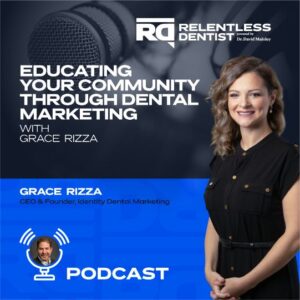 In 2009, in this dusty space in Avon, Colorado, I spent all my cash on learning for a six-month Ortho, Sedation, and Invisalign because I wanted to be this marketable person. One thing I could say, it is much harder than it looks — but not for Grace Rizza. She’s been growing businesses at the age of 22, and her approach to business is both commendable and inspiring. It’s no wonder she was a 2019 Honoree at the Daily Herald Business Ledger’s Influential Women in Business Awards.
In 2009, in this dusty space in Avon, Colorado, I spent all my cash on learning for a six-month Ortho, Sedation, and Invisalign because I wanted to be this marketable person. One thing I could say, it is much harder than it looks — but not for Grace Rizza. She’s been growing businesses at the age of 22, and her approach to business is both commendable and inspiring. It’s no wonder she was a 2019 Honoree at the Daily Herald Business Ledger’s Influential Women in Business Awards.
Listen in as Grace Rizza shares the importance of branding and effective dental marketing. It can be considered “unethical” not to market because you have a community of people that don’t understand how you can help them. Make sure that people know who you are and what you do to help them.
Tune in and get more insights on Magnificent Marketing
Key Quotes:
- “Who’s going to teach your community if you don’t.”
- “People need to stop trying to go viral and stop trying to be cool. They need to educate.”
- “Just know what you’re trying to accomplish with your marketing before you just start trying to do everything everybody else is doing, come up with a concrete plan.”
- “Don’t skip the branding process. Don’t skip the part where you ask yourself, or your advisor asks you, how do you want to be known in the community? What’s your intended reputation?”.
- “The right advisor will allow you to dream, but we’ll also tell you when you’re being unrealistic.”
- “Your time is a currency.”
- “The most expensive information is mediocre information.”
- “If marketing brings you joy, okay, put it on your plate. If it doesn’t, you need somebody to do it.”
- “What is your marketing and your branding, that visual aspect, what is it saying about you behind your back? Is it creating the right first impression? And then when those things are in alignment, then you should start the advertising piece, SEO still gets the best return on investment.”
- “If you’ve got great reviews and you’re ranking on top of Google, you will get new patients, and it will be consistent.”
- “You should have professional video ads that create an emotion.”
- “If you are comfortable on video and articulate, that’ll make your trust factor go up.”
- “People want to see real people.”
- “The most important thing that came from this today was treating marketing as an investment and not a cost.”
Featured on the Show:


by [email protected] | Mar 3, 2021 | Legendary Leadership
Podcast: Play in new window | Download
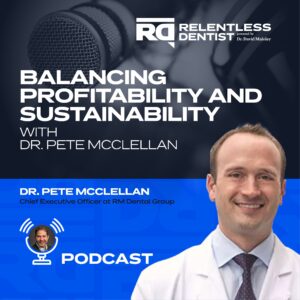 Over my years as a podcaster, some of my very favorite interviews have been when I’ve brought friends onto the show, and this episode will definitely fall into that category. Dr. Pete McClellan is a dentist with multiple practices in Kansas City, a visionary, and a fantastic leader who was named a top dentist in Hawaii for two years in a row.
Over my years as a podcaster, some of my very favorite interviews have been when I’ve brought friends onto the show, and this episode will definitely fall into that category. Dr. Pete McClellan is a dentist with multiple practices in Kansas City, a visionary, and a fantastic leader who was named a top dentist in Hawaii for two years in a row.
Listen in as we talk about the importance of creating a workplace where people actually want to work, as well as how a mission statement can help to weed out those who don’t fit within the culture of the practice. You’ll learn how we can all balance the need to make money with the desire to have a healthy and sustainable practice, and why creating a critical mass of believable people is one of the most sustainable things you can do for your business.
Be inspired and meet more Legendary Leaders
Key Quotes:
- “You can’t underestimate the power of a believable person in your world.”
- “If you can make more mistakes than anyone and still be successful, then that’s the game.”
- “My darkest moments were my biggest breakthroughs.”
- “There is so much power in finding people whose stories you believe.”
- “We need the practice to be profitable, but we need the practice to be sustainable.”
- “You have to put something in front of that team member that makes them realize they are part of something bigger.”
- “I’d like to give lots of credit to my two awesome business partners, Dr Daniel Rome and Dr Jeff Slutskiy. Our divide and conquer mindset has served us well.”
Featured on the Show:


by [email protected] | Feb 24, 2021 | Legendary Leadership
Podcast: Play in new window | Download
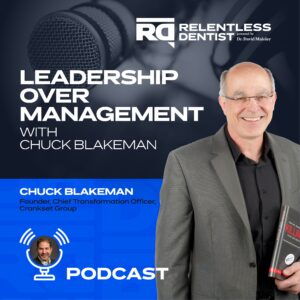 The single most important decision I made in my dental practice was the moment I stopped trying to create followers with this broken, top-down management style and started a leadership development program for everyone on my team. Today’s guest, Chuck Blakeman, is a world-renowned expert on this topic. He is a successful entrepreneur, best-selling business author, and TEDx speaker who has built 12 businesses around the world and now uses his experience to advise others.
The single most important decision I made in my dental practice was the moment I stopped trying to create followers with this broken, top-down management style and started a leadership development program for everyone on my team. Today’s guest, Chuck Blakeman, is a world-renowned expert on this topic. He is a successful entrepreneur, best-selling business author, and TEDx speaker who has built 12 businesses around the world and now uses his experience to advise others.
Listen in as Chuck shares some incredible insights and paradigm shifts that will really get you thinking and moving in the right direction. We discuss the concepts of management and dehumanization, how those two relate, and how different it is from true leadership. If you are working on building your business, leveling up on your leadership skills, and creating an incredibly rewarding program for your team, this episode is for you.
Be inspired and meet more Legendary Leaders
Key Quotes:
- “Look up ‘rehumanize’ in the dictionary—it’s not a word! You can’t rehumanize—you’re not allowed to do that. You can only dehumanize. Isn’t that fascinating? Something is broken.”
- “If you manage people, you dehumanize them. That’s very different than leading them, and we have to make that distinction because the leadership gurus and consulting network over the last years have conflated those two words to the point where we don’t know what the difference is.”
- “Leadership is absolutely essential in every business, and management is the worst thing to happen in business. You have to eliminate people being managed.”
- “People need to be led; stuff needs to be managed.”
- “All of the data is on the side of getting rid of managers, having fewer leaders, and figuring out how to divest the decision-making. How do we distribute the decision-making to everybody?”
- “You don’t even have to change the leader. You just have to change the leader’s mindset from ‘these people are stupid and lazy’ to ‘these people are smart and motivated.’”
- “Managers tell; leaders ask.”
- “There are three responsibilities of leadership: guard the values, champion the people, and pilot the results—not the process.”
- “Leadership is any act that improves the life, situation, or performance of another person. If you’re helping someone cross the street, that’s leadership.”
- “Good managers aren’t managing—they’re training and then getting the heck out of the way. They’re really leaders, and we should be celebrating that.”
- “Leaders always train with the intent of not being necessary.”
Featured on the Show:


by [email protected] | Feb 17, 2021 | Prescriptions for your Practice
Podcast: Play in new window | Download
 After a significant family loss, Dr. Meghna Dassani was driven to find solutions and treatments for breathing disorders. She joins the show today to share her key findings and processes that she implemented in order to solve disordered breathing for patients of all ages. You will be inspired by her passion and incredible story of problem-solving and growth.
After a significant family loss, Dr. Meghna Dassani was driven to find solutions and treatments for breathing disorders. She joins the show today to share her key findings and processes that she implemented in order to solve disordered breathing for patients of all ages. You will be inspired by her passion and incredible story of problem-solving and growth.
Listen in as Meghna discusses multiple issues, from behavioral problems in children to low energy issues in adults, that are often misdiagnosed. You will hear how she has found real solutions to many of these mistreated problems and added years to the lives of her family members and patients, as well as how her unique solutions help to treat breathing issues and ensure quality sleep.
Tune in and find solutions to common practice issues at Prescriptions for Your Practice
Key Quotes:
- “My favorite thing to tell people is that there’s no such thing as a bad kid. What we have is a tired kid. The signs and symptoms of a child that is tired and sleep-deprived are the same as a child that is diagnosed with ADD or ADHD.”
- “I tell parents that we are the quarterback. We are going to guide you, provide traffic control on what needs to be done because, especially in children, it’s a group effort.”
- “Those severe patients you were talking about—not all of them can use the CPAP. If you can use it, that’s amazing. If not, I have a solution to help you.”
- “That’s my favorite thing to do for patients: let them connect the dots and take their health into their own hands.”
- “My team sees this impacting our patients’ lives as their legacy. I could not ask for more. You empower them to help the people they see every day.”
- “It comes down to systems. If you have the right systems in place, it’s very predictable. It can be done consistently and successfully. Yes, you get paid, and yes, it can be profitable.”
Featured on the Show:


by [email protected] | Feb 10, 2021 | Maverick Mind Shifts
Podcast: Play in new window | Download
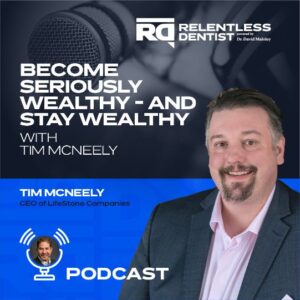 Tim McNeely is the CEO of LifeStone Companies and the host of the Dental Wealth Nation podcast. His modus operandi is to teach small business owners how they can harness the powers of the super-rich so they can build wealth, live amazing lives, and make a real impact in the world.
Tim McNeely is the CEO of LifeStone Companies and the host of the Dental Wealth Nation podcast. His modus operandi is to teach small business owners how they can harness the powers of the super-rich so they can build wealth, live amazing lives, and make a real impact in the world.
Listen in as Tim shares his insights into how the guilt mindset gets the better of so many of us and the difference between knowledge and implementation (including where many of us fall short!). You will learn his secrets and strategies to help us all increase our cash flow and avoid many of the common barriers to money and wealth accumulation.
Tune in to more Mind Shift Podcast
Key Quotes:
- “You want to continue to grow your wealth so you can take care of the people you love, support the causes you care about, and really make that impact in the world—and money helps you do that.”
- “If you shift that mindset from ‘how much money I can make?’ to ‘how many people I can serve?’, the money is going to take care of itself.”
- “If you’re not clear on your strategy—if you’re not clear on your why—then the ‘what you do’ and the ‘how you go about doing it’ are going to be really fuzzy, really abstract, and you’re going to be pulling strategies out of the air.”
- “You have to get clear first. Otherwise, it’s going to be utter chaos.”
- “There’s a lot of things that you’ve got to get right, and if you don’t have the right team members, if you don’t have the right people monitoring this, if you’re not implementing them correctly, they can become trouble for you.”
- “You want deep team collaboration among all the members of your team.”
Featured on the Show:


by [email protected] | Feb 3, 2021 | Legendary Leadership
Podcast: Play in new window | Download
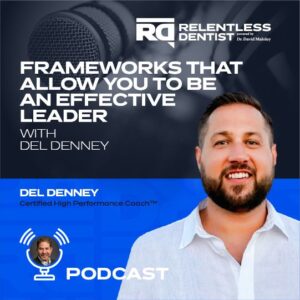 Del Denney is a keynote speaker, performance coach, and leadership consultant. Having consulted for the top personal development training organizations in the U.S., Del has addressed thousands of people in toxin seminars. He joins the show today to help distill the complex topic of leadership down to a simple framework that you can apply in your practice immediately.
Del Denney is a keynote speaker, performance coach, and leadership consultant. Having consulted for the top personal development training organizations in the U.S., Del has addressed thousands of people in toxin seminars. He joins the show today to help distill the complex topic of leadership down to a simple framework that you can apply in your practice immediately.
Listen in as Del shares how he developed his growth mindset and ended up being an expert and leader in the personal development field. You’ll learn why people lack clarity in purpose and vision, as well as how that applies to dentistry, so you can better find clarity and purpose in your career. Del also walks through the value of having frameworks to follow and provides one that will help you increase your influence with your staff and your patients.
Be Inspired and meet more Legendary Leaders
Key Quotes:
- “My father was in prison, I was doing crazy stuff, and long story short, I realized that the path I was on would lead to the same place he was at. It was Christmas night, and I realized that if I want all of this to change, I have to change. That’s when my personal growth journey started.”
- “It doesn’t have to be this fluffy thing—follow step 1, step 2, step 3. People overcomplicate things. Just find the framework and go with it.”
- “The question is: Who do you want to serve? And how do you serve well? That helps to guide you into your purpose.”
- “When we get distracted, that’s when unhappiness comes. When we get clear on our vision and keep it in the forefront of our mind, we’ll be much happier.”
- “The fact is, we’re all leaders, and I hope that people realize that. Leadership is influence.”
- “The foundation of leadership is developing relationships with your staff and patients.”
- “A great leader is a servant leader. Your job is to listen to your staff. This is a chance to observe your staff so that you can serve your staff.”
Featured on the Show:


by [email protected] | Jan 27, 2021 | Maverick Mind Shifts
Podcast: Play in new window | Download
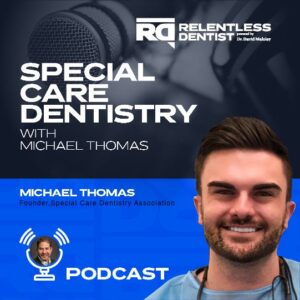 Michael Thomas joins the show today to talk about the Special Care Dentistry Association and share why special care dentistry is so close to his heart and such an important part of his dentistry career. He also offers insight into the unique mental, physical, and emotional needs that crop up in special care dentistry.
Michael Thomas joins the show today to talk about the Special Care Dentistry Association and share why special care dentistry is so close to his heart and such an important part of his dentistry career. He also offers insight into the unique mental, physical, and emotional needs that crop up in special care dentistry.
Listen in as we discuss the importance of understanding, connection, and trust when it comes to working with special needs patients, as well as how dentists can better equip themselves to provide care for patients with special needs. You’ll hear some great tips and techniques for communicating with and caring for patients who need special care in order to become acclimated to dental procedures.
Tune in to more Mind Shift Podcast
Key Quotes:
- “The dentists who do have the most fulfilling careers—it’s the connection to the patient, not the connection to the procedure that really defines them.”
- “She didn’t look at humanity the way any of us did. She looked at it without any hatred or prejudice or any kind of negativity. She saw people for who they are.”
- “As the trust goes up, the need for drugs and sedation goes down.”
- “What I’m seeing is that many dentists do not want to treat special needs individuals because they take too much time, many of them are Medicaid patients, and they don’t have the financial reimbursement that many other patients do.”
- “They call it the practice of dentistry, and you are never officially done learning.”
- “There are so many different facets on how you, yourself, can be more aware in delivering the best care possible to not only the patient with special needs, but their caregiver as well.”
Featured on the Show:









 Over my years as a podcaster, some of my very favorite interviews have been when I’ve brought friends onto the show, and this episode will definitely fall into that category. Dr. Pete McClellan is a dentist with multiple practices in Kansas City, a visionary, and a fantastic leader who was named a top dentist in Hawaii for two years in a row.
Over my years as a podcaster, some of my very favorite interviews have been when I’ve brought friends onto the show, and this episode will definitely fall into that category. Dr. Pete McClellan is a dentist with multiple practices in Kansas City, a visionary, and a fantastic leader who was named a top dentist in Hawaii for two years in a row. The single most important decision I made in my dental practice was the moment I stopped trying to create followers with this broken, top-down management style and started a leadership development program for everyone on my team. Today’s guest, Chuck Blakeman, is a world-renowned expert on this topic. He is a successful entrepreneur, best-selling business author, and TEDx speaker who has built 12 businesses around the world and now uses his experience to advise others.
The single most important decision I made in my dental practice was the moment I stopped trying to create followers with this broken, top-down management style and started a leadership development program for everyone on my team. Today’s guest, Chuck Blakeman, is a world-renowned expert on this topic. He is a successful entrepreneur, best-selling business author, and TEDx speaker who has built 12 businesses around the world and now uses his experience to advise others. After a significant family loss, Dr. Meghna Dassani was driven to find solutions and treatments for breathing disorders. She joins the show today to share her key findings and processes that she implemented in order to solve disordered breathing for patients of all ages. You will be inspired by her passion and incredible story of problem-solving and growth.
After a significant family loss, Dr. Meghna Dassani was driven to find solutions and treatments for breathing disorders. She joins the show today to share her key findings and processes that she implemented in order to solve disordered breathing for patients of all ages. You will be inspired by her passion and incredible story of problem-solving and growth. Tim McNeely is the CEO of LifeStone Companies and the host of the
Tim McNeely is the CEO of LifeStone Companies and the host of the  Del Denney is a keynote speaker, performance coach, and leadership consultant. Having consulted for the top personal development training organizations in the U.S., Del has addressed thousands of people in toxin seminars. He joins the show today to help distill the complex topic of leadership down to a simple framework that you can apply in your practice immediately.
Del Denney is a keynote speaker, performance coach, and leadership consultant. Having consulted for the top personal development training organizations in the U.S., Del has addressed thousands of people in toxin seminars. He joins the show today to help distill the complex topic of leadership down to a simple framework that you can apply in your practice immediately. Michael Thomas joins the show today to talk about the
Michael Thomas joins the show today to talk about the